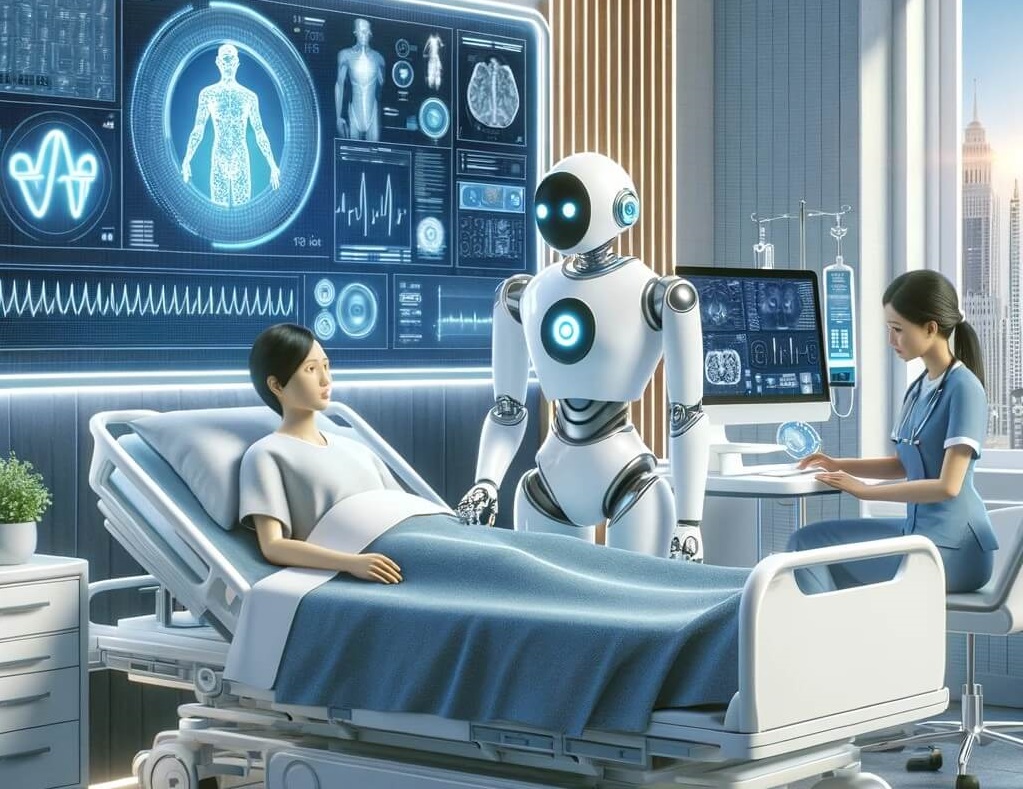In recent years, the health sector has witnessed a transformative shift with the integration of advanced Artificial Intelligence (AI) technologies. From diagnostics to personalized treatment plans, AI is revolutionizing healthcare, making it more efficient, accurate, and accessible. Let’s explore how advanced AI is shaping the future of the health sector and the profound impact it has on patient care.
Drug Discovery and Development: AI is accelerating the drug discovery process by identifying potential compounds and predicting their effects on the human body. This not only speeds up the development of new drugs but also reduces the cost significantly. AI models can simulate how new drugs will interact with different genetic profiles, allowing for more targeted and effective treatments.
Telemedicine and Remote Monitoring: AI has significantly enhanced telemedicine capabilities, allowing healthcare providers to remotely monitor patients and provide consultations. Remote monitoring tools can track patient health metrics in real-time and alert doctors to any concerning changes. This continuous monitoring is particularly beneficial for managing chronic diseases and providing care in remote or underserved areas.
Optimizing Resource Allocation: AI can analyze hospital data to optimize the allocation of resources such as staff, equipment, and bed space. By predicting patient admission rates and identifying bottlenecks in the system, AI helps healthcare facilities operate more efficiently and provide better care to patients.
Advanced AI in healthcare, AI diagnostics, personalized treatment plans, AI in drug discovery, virtual health assistants, telemedicine, healthcare efficiency, AI ethical considerations, predictive analytics in healthcare, remote patient monitoring
#AIinHealthcare, #HealthTech, #MedicalAI, #Telemedicine, #VirtualHealth, #PersonalizedMedicine, #AIDiagnostics, #HealthcareInnovation, #FutureOfHealthcare, #HealthAI
Transforming Diagnostics with AI
Early and Accurate Diagnosis: One of the most significant impacts of AI in healthcare is its ability to provide early and accurate diagnosis of diseases. AI algorithms can analyze medical images, such as X-rays, MRIs, and CT scans, with a precision that rivals or even surpasses human radiologists. For instance, AI-powered tools are now capable of detecting early signs of diseases like cancer, often before they are visible to the human eye. Predictive Analytics: AI can analyze vast amounts of patient data to identify patterns and predict potential health issues. Predictive analytics help in foreseeing outbreaks of diseases, understanding patient risk factors, and preventing hospital readmissions. This proactive approach enables healthcare providers to take preventive measures, improving patient outcomes and reducing healthcare costs.Personalized Treatment Plans
Tailored Therapies: Advanced AI systems can analyze an individual’s genetic makeup, lifestyle, and medical history to develop personalized treatment plans. This customization ensures that patients receive therapies that are most effective for their specific condition, minimizing side effects and improving the likelihood of successful outcomes.Drug Discovery and Development: AI is accelerating the drug discovery process by identifying potential compounds and predicting their effects on the human body. This not only speeds up the development of new drugs but also reduces the cost significantly. AI models can simulate how new drugs will interact with different genetic profiles, allowing for more targeted and effective treatments.
Enhancing Patient Care
Virtual Health Assistants: AI-powered virtual health assistants are transforming patient care by providing 24/7 support. These assistants can answer medical queries, remind patients to take their medications, and even monitor vital signs through wearable devices. They offer a personalized care experience, ensuring patients feel supported at all times.Telemedicine and Remote Monitoring: AI has significantly enhanced telemedicine capabilities, allowing healthcare providers to remotely monitor patients and provide consultations. Remote monitoring tools can track patient health metrics in real-time and alert doctors to any concerning changes. This continuous monitoring is particularly beneficial for managing chronic diseases and providing care in remote or underserved areas.
Operational Efficiency in Healthcare
Streamlining Administrative Tasks: AI is automating routine administrative tasks, such as scheduling appointments, processing insurance claims, and managing patient records. This automation frees up healthcare professionals to focus more on patient care and reduces the likelihood of human errors.Optimizing Resource Allocation: AI can analyze hospital data to optimize the allocation of resources such as staff, equipment, and bed space. By predicting patient admission rates and identifying bottlenecks in the system, AI helps healthcare facilities operate more efficiently and provide better care to patients.
Ethical Considerations and Challenges
While the benefits of AI in healthcare are immense, it is crucial to address the ethical considerations and challenges associated with its implementation. Issues such as data privacy, the potential for bias in AI algorithms, and the need for robust regulatory frameworks must be carefully managed to ensure the responsible use of AI in healthcare.Conclusion
The integration of advanced AI in the health sector is revolutionizing the way we diagnose, treat, and care for patients. By enhancing diagnostic accuracy, personalizing treatment plans, and improving operational efficiency, AI is poised to transform healthcare delivery. However, as we embrace these technological advancements, it is essential to address the ethical challenges and ensure that AI is used responsibly to benefit all patients. The future of healthcare is undoubtedly bright, with AI leading the way towards a more efficient, effective, and patient-centered system.Advanced AI in healthcare, AI diagnostics, personalized treatment plans, AI in drug discovery, virtual health assistants, telemedicine, healthcare efficiency, AI ethical considerations, predictive analytics in healthcare, remote patient monitoring
#AIinHealthcare, #HealthTech, #MedicalAI, #Telemedicine, #VirtualHealth, #PersonalizedMedicine, #AIDiagnostics, #HealthcareInnovation, #FutureOfHealthcare, #HealthAI



0 comments